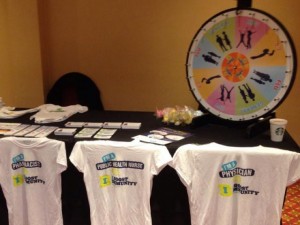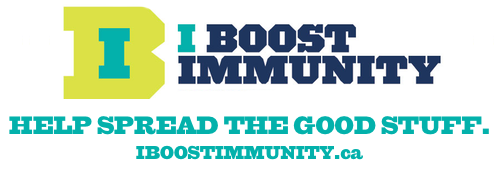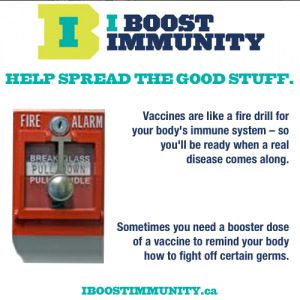Guest post by Dave Whiteley, ImmunizeBC & Public Health Association of BC
If you’ve been following the news or social media over the past several weeks, you’ve seen the growing debate in regards to vaccines and immunization. The measles outbreak in Disneyland continues to dominate, with daily updates on the spread of the disease, while California’s 2014 whooping cough outbreak continues into 2015. Politicians are either championing the science of vaccines or the right to choose whether or not you are immunized, which has larger-scale impacts on the ongoing debate between pro-vaxxers and anti-vaxxers.
There is a common thread in all of these stories: a clear gap between public knowledge about immunization, and the science behind immunization. There is a concern that misinformation and complacency has resulted in some parents choosing to skip certain vaccines, or avoid immunizations all together.
I Boost Immunity is an innovative online platform that was launched in British Columbia (BC) in November, 2014. Sponsored by the Public Health Association of BC (PHABC), it allows British Columbians to share information about the benefits of immunization using social media. The program builds on lessons learned from previous approaches to immunization education by tapping into the silent majority of people who do vaccinate their children, and allowing their stories to speak for themselves. The program is based on the belief that facts alone are often insufficient to get the vaccination message across, but combining them with personal stories can have a real and lasting impact among friends, families, and co-workers. Ultimately, the goal of I Boost Immunity is to raise awareness and action in BC regions with lower than optimal immunization rates.
“I Boost Immunity is based on the idea that giving people a place to celebrate their choice to vaccinate themselves or their kids is long overdue,” says Michael Barnes, executive director of PHABC. “We crowdsource stories from everyday British Columbians to provide a real life perspective on how important vaccines are in protecting us, not just as individuals, but our community as a whole.”
For many, the term ‘immunization booster’ refers to that extra dose of vaccine given to ‘boost’ protection against disease. “We think of the term a little bit a differently with regards to this program,” continues Barnes. “An immunization booster is a person who seeks to raise ‘community immunity’ by using social media to share the benefits of immunization in exchange for points, badges, and rewards.”
Anyone can easily sign up to become an immunization booster by visiting www.IBoostImmunity.ca. The platform includes a ‘Tell us your story’ application, which encourages people to share why they support immunization, as well as ‘Booster U’, a short training course designed to help new boosters become confident and successful immunization champions. Boosters can share articles and stories through Facebook, Twitter, and email, and are awarded points for each activity they perform. Accumulated points are recognized with online achievement badges, and can also be redeemed for I Boost Immunity-themed rewards.

I Boost Immunity’s display at the Public Health Association of BC 2014 Conference and AGM (Photo: Dave Whitely, used with permission).
I Boost Immunity and its community of Immunization Boosters has been busy spreading the good stuff. The grassroots platform currently hosts 150 articles and personal stories, and 240 photos for people to peruse. There are almost 100 Boosters on the site, and almost 80,000 booster points have been earned by sharing site content on Facebook and Twitter (with over 240 Facebook shares and over 150 Twitter shares). While the platform is still growing, it is safe to say people want to make disease prevention contagious.





